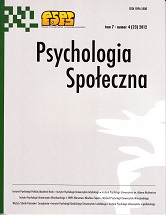Aktywizacja stereotypu osoby niemoralnej nasila motyw czystości
Activation of a stereotype of an immoral person facilitates the cleanliness motive
Author(s): Wiesław Baryła , Michał Parzuchowski , Konrad Bocian Subject(s): Psychology
Published by: Wydawnictwo Naukowe Scholar Sp. z o.o.
Keywords: cleanliness; morality; disgust; stereotype activation
Summary/Abstract: Bodily purity and physical cleanliness is closely related to a large variety of moral judgments. Moral transgressions are often perceived to be unclean thus elicit the desire to cleanse. We propose, that desire to cleanse can be induced by thinking about immoral behaviors of others, which leads to 1) higher preference for cleansing products; 2) behavioral action of cleaning to protect possible contamination. In two experiments participants were primed with an immoral target person (a pedophile) or a control moral target (an altruist, a nun, or a secretary). In each case, the results showed that immoral behaviors of other people can increase the desire to cleanse. In Experiment 1, participants that imagined a pedophile showed higher preference for cleansing products, than participants in the control groups. In Experiment 2, students who fi lled a questionnaire about personality traits of a stereotypical pedophile visited University’s lavatories twice as often as participants in a control group. Taken together, these data indicate that merely thinking about foul behaviors of others can activate a motive for cleanliness.
Journal: Psychologia Społeczna
- Issue Year: VII/2012
- Issue No: 23
- Page Range: 297-306
- Page Count: 10
- Language: Polish

